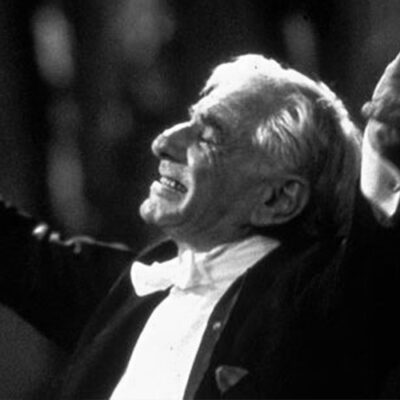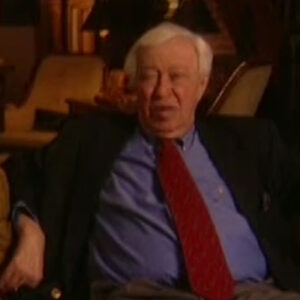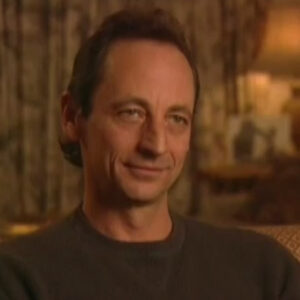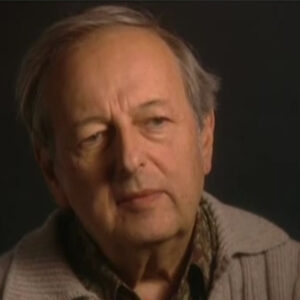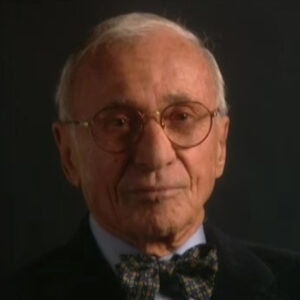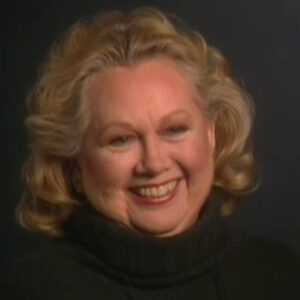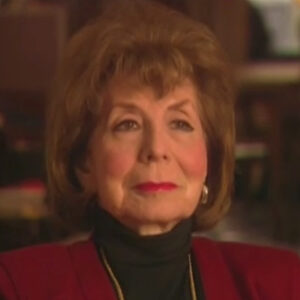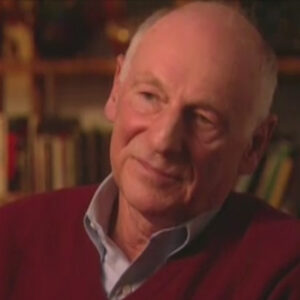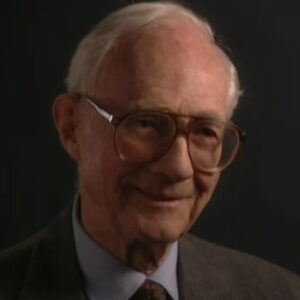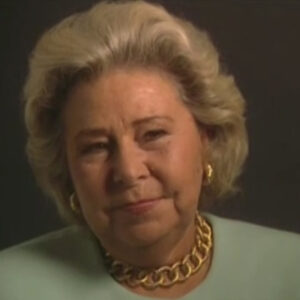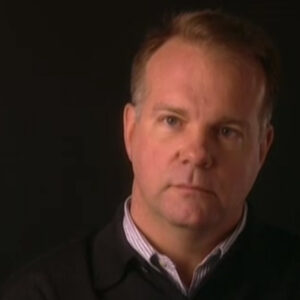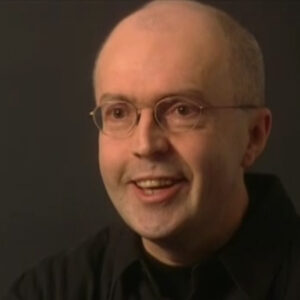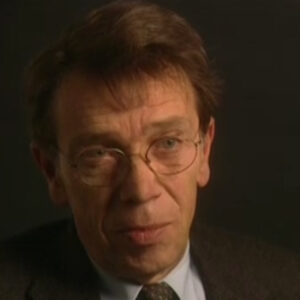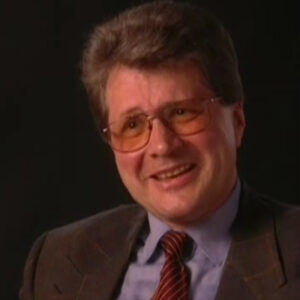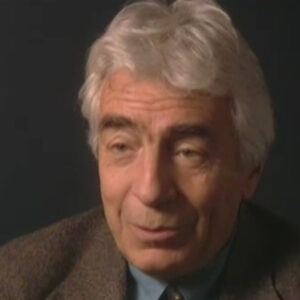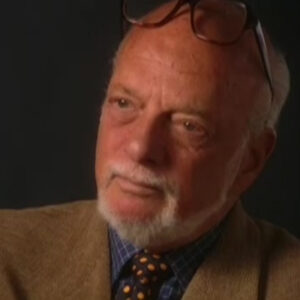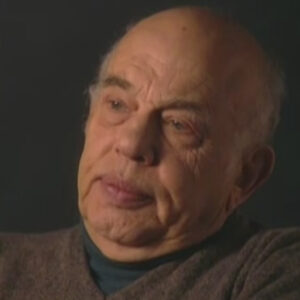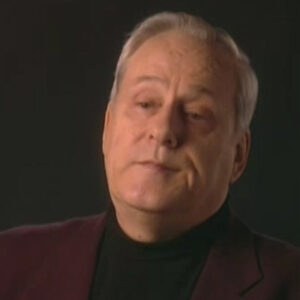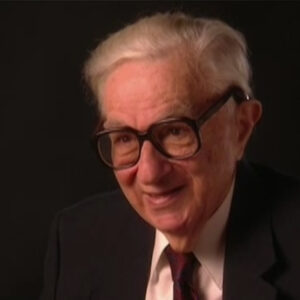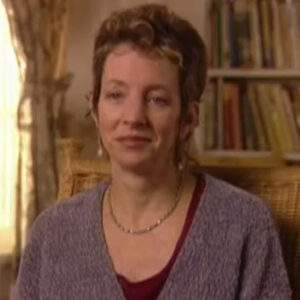Speaker I think I was 15 years old when I first met Lenny because it was at Curtis Institute. We both were students of the Curtis Institute. Of course, he was quite a bit older because he was already a Harvard graduate when he went to Curtis. And I was a little teenager from Paris. So I was very young and didn’t know too much yet about American life. But Lenny kind of was like an older brother. He introduced me to all kinds of things and explained jokes to me. And it was a wonderful relationship. Right from the start, we had some of the same teachers. There is a bit of anger over with our piano teacher and Fritz Reiner, the great conductor was our conducting teacher.
Speaker When you say that you have this immediate connection, what do you think was the basis of that?
Speaker You know, it’s very difficult to to understand just what makes people understand each other and become friends. It’s hard to say. But I as I said, he was like an older brother to me. And it was a wonderful relationship from the start. Actually, the moment it really began to be a real friendship was when Fritz Reiner invited us to come to Chicago to hear him conduct. What opera was it again? Rosenkavalier, I believe it was. And so we took the train together. And on that trip, we really we really bonded. We became real friends. When you talk about on the train, I wish I could remember what we talked about, everything of mostly music. I mean, all our conversations really were about music, old music, new music composition, because we were both very busy composing at that time. But it’s hard to remember because this is quite a while ago, I should say. And what followed was 50 years of friendship, more than 50.
Speaker And I’ve asked you this before, and you said you’ve mostly talked about music.
Speaker Give me an example. When two composer conductors such incredible talent get together and talk about music. What’s a typical conversation?
Speaker Well, we had many very different compositions. We had differences of different compositions. For instance, about Gershwin. I knew very little about Gershwin when I came to this country and he kind of introduced me to Porgy and Bess and played some songs for me. I remember on the piano and and I became very excited about that experience. And he knew a lot about jazz. These were all fields that I didn’t know much about because I became a musician because of Mozart, Beethoven and but and he had this whole other background as well. To which he introduced me, that was kind of exciting, but we also talked about more a bit of an.
Speaker Did did he think Porgy and Bess was a great work?
Speaker Yes, he loved Porgy and Bess and so did I. Yes, certainly great American opera.
Speaker Let’s go back to Curtis and featuring stories about Lenny in his class. Lenny is a student at Curtis.
Speaker Well, I never thought of Lenny as a student, even though he was a student at Curtis, but he always seemed to know what he was doing. He was very professional. And as a matter of fact, speaking of Fritz Reiner, I remember when he called for theater by his first name, said Fritz and Fritz Reiner responded with, yes, Mr. Bernstein. He wouldn’t have that kind of familiarity between teacher and student.
Speaker How did the other students feel about Lenny Kravitz, the fact that he came from Harvard and that set him apart and the fact he came from Harvard probably did not set him apart because there were all kinds of different ages. It created some young I was probably the youngest, but there was quite a few that of his age. He must have been 19, almost 20 at that time.
Speaker OK, I’m sorry, I had heard that Lenny was a bit arrogant. Is it that curse? Is that did you see any examples of that, of the senses already knowing so?
Speaker Well, Lenny had certainly a kind of. He was not exactly what you would call full of himself. He wasn’t that way because he was too loving and that was but that loving, innocent exuberance, of course, was very special. And there were people who resented him, I’m sure, probably because he was not they were not the object of his attention or love, and then they would resent him and maybe be jealous of him. I never had that kind of a feeling, never, because he was so wonderful to me. So, as I said, like an older brother.
Speaker So did he know when he was a Kurd who what he wanted to be?
Speaker I mean, he’s obviously studied conducting, but was it clear to him what if what his path was going to be? Do you think.
Speaker I think Leni knew very much that he wanted to be a conductor and a composer and a pianist. I think he wanted all three. And so today we had that in common.
Speaker I think that was very clear from the beginning.
Speaker And in class, he hid it very well, beautifully.
Speaker When did you learn when you both participated in the first summer of Tanglewood?
Speaker The first you know, I think if my memory is correct, he was not there the first some of the first time I was there alone. I think he came the second summer. For some, I was 19, 50. Yeah, 14, 1940, 1940, and I think he came 41. Am I wrong?
Speaker I thought it was there from the beginning that I mean, I well, I could be wrong about that, but doesn’t mean you were at Tanglewood.
Speaker I mean, the two of you were the the the great proteges, of course, because of history.
Speaker And that’s right. There was another teacher we had in common. We had Koussevitzky in common. And Koussevitzky was very fond of both of us and very kind and fatherly to both of us. It was a real father figure.
Speaker Can you talk a little bit about you and Lenny? Because I have wonderful pictures and footage of the two of you at Tanglewood. How do you describe the atmosphere of Tanglewood at that time? What it was, what it was trying to do?
Speaker Well, Tanglewood was Serge Koussevitzky. I mean, he was the father figure of the whole institute. And and he was an idealist and he was warm and loving and interested in the young and in new music. It was really a wonderful kind of thing to have to be at that center so exciting every day was exciting. And I always looked forward to every class with Koussevitzky, and every time he conducted it was exciting because he would conduct Tchaikovsky’s Fourth Symphony for the fortieth time, as if it were the first time. And it was I learned a lot from Fonkoze risky. And I’m sure so did Lenny.
Speaker What was he what was he like when everybody called him cuzzi and had all kinds of crazy isms right in there? Can you tell me some of them?
Speaker Well, that’s true. He was called cuzzi in a kind of familiar way. But to him, of course, we didn’t see that we had too much respect and we called him Dr. Koussevitzky. But I remember the one story that I love to tell is, is when I went to the barber in Lenox and. The barber said, I cut the great man’s hair today, it really was here, no, no, we went to to his house and I cut his hair in his house. I see. And a little later, the barber said, well, he has two students that he spoke of, one he called Apollonian and the other Dionysian. And of course, then and I never found out which one was which. But I think it’s quite obvious that the Dionysian is very.
Speaker What did he have nicknames? Because they didn’t have a nickname for many that nickname.
Speaker But as of endearing, he may have had one, but but he may have Russianness, the name. He certainly didn’t recognize my name. You were. I was always Lucas’.
Speaker I think my name is Oscar, by the way.
Speaker Lenny called me always Lukie. He didn’t call me, Lucas was lucky.
Speaker Did you perform together at the table when we performed everywhere together before you would even maybe it was before or around that time when I conducted the Ravell concerto and he played it, that was in an outdoor setting in New York City.
Speaker He played it beautifully and.
Speaker In Tanglewood, we did not do anything together that I remember, except, yes, for Kazmierski birthday. We did. We played forehands together.
Speaker Absolutely, we have that one picture.
Speaker That’s right, with our wives page turning blue, by the way, Cornelia, my wife was a very good friend of Lennie’s, too, and of and of Alicia.
Speaker Prinstein, um, what do you do? Who do you who would you say was the greatest influence on money as a conductor?
Speaker I think it would be presumptuous of me to decide whether Rainer had a greater influence than because of his Skywalkers Savitsky greater influence in Rainer. But my feeling is that Koussevitzky was closer. He was a warmer personality, and I think he was closer to both of us, actually.
Speaker And what about his technique or his style? Influence, influence?
Speaker Well, there again, that’s very difficult to see because Rainer was a wonderful technician and had a great influence, I think, on our conducting technique. Koussevitzky may have had a greater influence on how to treat musicians in the orchestra, how to talk to them. How to collaborate.
Speaker The levy didn’t use at the time for very long time, right?
Speaker I thought I needed to use a baton. I’m not sure about that. I’m the one who dropped the baton when I developed tendonitis and cramping around the baton did it. So I threw it away after many years of using it. But I think obviously always the baton of I remember very long, you see, you know more than I do.
Speaker Only later did we get these. And I can’t remember if it’s because Metropolis didn’t use it, but because he didn’t use it, because he used a baton.
Speaker But it’s more that he didn’t have rain. I had a big baton and because we’d get a smaller one, Metropolis didn’t use it at the time.
Speaker I wished I remembered you knew less. Well, who was it who tried to get money to change his name because.
Speaker I think at one point thought that Brounstein was not a good name for a conductor. But I’m glad that Lenny persevered.
Speaker Can you tell that story that he wanted him to change his name, to remember what I think of Lenny Burns?
Speaker I have not got a very good anecdotal memory. I’m afraid some of these things that I you know, I think that we did consider it for a moment to because.
Speaker I’m sure that you consider that. I’m sure we talked about it. But it just wouldn’t be like Lenny to change his name for political reasons. He knew that he could surmount these problems.
Speaker Did you know from the moment you met him that he was remarkable?
Speaker Absolutely. The moment I met him, I knew that he was unique. In what way? Well, first of all, his intelligence was incredible. Then his knowledge of music was incredible and his talent on the piano and composing in the facility and the lovingness that emerged from from everything and the fact that that’s what made him a very special conductor.
Speaker How did he communicate that to this orchestra?
Speaker If you believe I knew you were a soloist.
Speaker Oh, well, he did his age of anxiety and I was the first one who played it under his button and the first one I recorded with him. And I think maybe the last one to record recorded with him, because many years later we did a second recording. The first one was with the New York Philharmonic and the second one was with the Israel Philharmonic. We did that one in Berlin. And so I, I had the pleasure of playing that piece. I forgot what I did. Anything else were under oath, but I not. Probably not.
Speaker I think he previewed one other thing that I can’t remember.
Speaker Well, I conducted his music a lot. Of course, I think he premiered.
Speaker And he was wonderful about conducting my music. He did more of my music than any other conductor alive.
Speaker Let’s talk a little bit about that influence on the repertoire as a conductor.
Speaker Well, Lenny conducted a lot of classical music, but he certainly also included a lot of contemporary music. He was not at the time of our when we were young, he was not very much into the eternal school, the 12 to one school later on. He didn’t mind doing some of those pieces also. But at first he was definitely not in that camp at all, and neither was I. Even though I became the success of Arnold Schoenberg as a teacher at UCLA, I never really felt that I was a self-taught composer.
Speaker But let me play. I mean, I think you quoted once saying you played the music that he loved. Yes, exactly. But in fairness, he he really extended the repertoire and didn’t need to include a lot of American music, even if he didn’t love it.
Speaker Yes. He a lot of American music of his friends, whether he loved it or not. But of course, he was most convincing when when he loved something. Then you become a really convincing conductor. If you don’t love it, you’re a taskmaster. You’re you’re okay. But but you have to love it to really put it across to the to the public. Who did you love the most? Besides, who Mala, whom did he love the most? That’s a very good question.
Speaker In modern music.
Speaker General. Or in general? Well, of course, the classics I think he adored. I don’t think he had any particular favorite among the classics when it came to modern music.
Speaker He probably loved Copeland particularly. And you can tell that in his own music, you can tell the love for Copeland. And again, that’s something we shared because we both were in fact, I met Copeland just before I met Lenny, so we we had this friend in common, Aaron Copeland, the great American dean of American music, I should call him. We often were together at the Russian Tea Room at the same table with Copeland presiding.
Speaker This couple never speak to you about money or Copeland and I must have talked about many, many, many times, can you remember?
Speaker Anything he had to say about money?
Speaker Well, he could be corporate, could be very critical. He was a very in his own way. He was never critical in a mean way, never. But he could be very critical of the kind of a he didn’t go in for that kind of indulgence that he had. He was much more matter of fact. In fact, it was very strange to to see Lenin conducting Lincoln Portrait and with enormous gestures, loving, enormous gestures, theatrical and all that. And Aaron Copland narrating This is my idea of democracy and a very totally without any drama whatsoever, very matter of fact. And then making these huge gestures that you could see the disparity between the two personalities in that moment.
Speaker Did that relationship change over the years?
Speaker I think they were friends of all along, I mean, they may have had arguments now and then, but. Lenny and I never had an argument, I didn’t think it was amazing, we just had years and years of years without any argument whatsoever. But I imagine that Copeland then is sometimes probably had an argument that he would often bring his music to bring his to play before anybody heard it. Yes, we played our music for each other quite a bit, trying it out on each other.
Speaker Did you ever hear something that you felt wasn’t working?
Speaker In other words, how forthright were you able to be with Lanny Davis is a conversation we could be completely forthright about, about each other’s work and and we were not afraid of hurting each other’s feelings because we knew. We knew we believed in each other. So there was no problem there. But there were certainly books that I loved more than others. And I may have said that to him, but I don’t remember exactly what kind of witch work I would would have been critical of. So I haven’t got that kind of memory.
Speaker I’d like to talk about those conversations and feeling that it works well.
Speaker You can certainly recognize Lennon’s music because the personality is there. You say to me, style means personality. And Lenny had so much personality. So of course, that is reflected in the music, how to define that in words. That’s not quite easy. There was an American touch and of course, it’s how you use things and make them your own. He would use Copeland or Gershwin or whatever and make it completely his own. But that’s difficult to put into words. But that, I think, is typical of news, very often people think that Lenny was not a serious composer because of the jazzy element or the Broadway element in his music. I think that is totally wrong. I think that. When we’re passionate, we’re serious. So to me, Westside Story is among the most passionate pieces that land is ever done and therefore among the most serious, whether it’s Broadway or not, has nothing to do with it. Where some neoclassic work of is that people considered serious would be less serious to me because it seems less passionate to me.
Speaker Did he ever talk to you about the notion of serious composer, not serious composure? Did he buy some of the press about himself as a composer?
Speaker Yes, I think Lenny was very touchy about that whole issue. He said people don’t consider me a serious composer. And I would argue with that and try to point out my point of view. But he was I think he was a little upset that he wasn’t taken as seriously as, for instance, Aaron Copland was at that time.
Speaker And you think that he’s not being taken seriously as a serious composer had to do with the fact that he also worked for Broadway? I mean, do you think that was the reason?
Speaker Yes, I think people put you in a cubbyhole. They kind of label you and they label the Bernstine the wrong way, the way every label is always wrong, because it’s always a kind of cliched. You have to rise above that and understand what a person is really about. We always put them into I mean, Mozart was known for years and years as the kind of lovely boy who wonderboy who wrote lovely music and conductors would would become sort of almost effeminate and and gracious when they play conducted Mozart or muscle when they conducted Beethoven. Clichés like that are very bad for the music and based on the wrong understanding.
Speaker What do you think of Wellspring?
Speaker Compositional urges came from what was the thing that made you are, I think, a very disciplined composer, and you have, I think, very from everything I’ve read and what I know about your music, you are really very clear about what it is you’re trying to do and what inspired you. What do you think Lenny had that or do you think, Lenny?
Speaker I mean, he was very text oriented. Do you think he needed a text in order to compose?
Speaker Well, that’s an interesting theory. I never thought of Lenny needing a text to compose, but certainly texts help. They give us ideas. It helps me to have a text. You think of things you would think without the text. So it does help in the age of anxiety. Certainly the fact it’s based on the Auden poem and gave birth to all kinds of ideas you wouldn’t have had without it. So some people get ideas from from a text. Other people get it from the 12 Tornero. These things stimulate composers. I think Lenny had a very good idea of what he was about and what he wanted to do. Above all, he wanted to love what he was writing. And that’s ultimately what’s the most important. If we consider composition a task, we’re not going to make it. It’s got to be love that prompted.
Speaker Do you think that it’s more difficult? I mean, I know the answer to this, but if you could talk about what those conflicts are doing it with, what is a composer, conductor as opposed to a composer and the influence that that has over the consequences when we are conducting can get into our way, of course, with a busy conducting schedule.
Speaker Do you have to wait until that stops to compose? On the other hand, I personally find that when I’ve done a great and Beethoven ninth, it makes me feel like composing immediately, puts me on cloud nine and vice versa. If I did a terrible one, it would depress me and hurt my composition. So it depends on how well it’s going and vice versa. If the competition goes well, it helps me as a conductor and if the composition goes badly, it makes me less self-confident, which is bad for a conductor. You have to have a lot of self-confidence. So I think that is something that helps and doesn’t help. Same thing. I think Mahler would probably say the same thing. There was Mendelssohn, Mahler, Bernstein. Those are the best known ones, I guess, among the composer conductors was less well-known composer. Well, list is mostly known as a pianist and composer. So if he also conducted I don’t even remember if he did or not, that was not his main thing.
Speaker You only talked once about I read an interview that if one is a composer and conducts if his allowed to bring a different kind of perspective, I think you call it a love searchlight on the music. You talk a little bit about that.
Speaker Well, yes, I don’t believe much in the word interpretation because of self aggrandizing, I mean, it’s the music doesn’t need to be interpreted. I don’t need my music to be interpreted. Leonatus needs music can be interpreted. What we need is that loving searchlight put on the music so that we get it right. So we bring out what’s unique, what the composer liked in it. That’s what we have to bring out. Unfortunately, in school we are always taught about sonata form variation from all the things that bad composers do too. We don’t talk about the things that make a piece unique. That’s what we should analyze because that’s what has to be brought out. What makes Beethoven different from his contemporaries and so forth.
Speaker And do you think that was the basis of many successes, a conductor that he he understood that he brought a different understanding to the composer’s intention?
Speaker I think the fact that he he conducted and brought out what he loved in the music is what makes it so convincing and lovable. And that’s what makes it different from other interpretations. What was it like in rehearsals? The remarkable thing about Lenny in rehearsal was that he didn’t seem to worry about lack of time, he just went on and on and on and well, people just had to pay for overtime. It was necessary and he could get away with that. But most conductors cannot get away with that. And nowadays, I would see a conductor is measured by his efficiency. How well he takes advantage of the available time is really what makes a conductor efficient and work. And and when it works, it’s that he took advantage of every minute. I’m afraid I do that when I conducted I’m always conscious of time, but then he wasn’t that way.
Speaker And how it did he would just ignore the union rules or what I mean, how does that work?
Speaker Just goes on. And he would lecture to the orchestra for a long time. And and meanwhile, people would look at their watch and I would go by it. It didn’t seem to bother him at all. As I said, he could get away with that and others could not.
Speaker What would it be fair to say that, Lenny, I know you’ve talked a bit about the sort of celebrity conductor, the jetset conductor and the public relations, and that you find that somewhat destructive, which I think I agree with in terms of of.
Speaker The image of a conductor.
Speaker Can you talk about that with respect to money for Lenny had such a strong image. I mean, he really didn’t even have to think of image building because the image was always there in the forefront. He was not one of those introvert people who sort of shy of himself into himself. He was always outgoing and outreaching. And that idea of a conductor may not be ideal for composer.
Speaker I’ll never forget the time he premiered, my fourth one, which turned out to be the the third of the three Baroque variations, I had written the piece and it hasn’t had any performance. And I was looking forward to Lenny’s first performance of the work when on the night before the first rehearsal, I got a telephone call from Lenny at 11:00 o’clock at night saying, look, I don’t understand your music anymore. It’s so different. It’s a while, so avant garde. Can you come and explain it to me? I said, you mean now at 11 o’clock at night? Said, yes. Why not? All right. So I grabbed a cab and came over and. I explained it to him carefully, we went through the whole squad together at two o’clock in the morning, he started explaining it to me and and he certainly was amazing. But even more amazing was the next morning at rehearsal time. I don’t know whether nine, 930 or whenever the New York Philharmonic, he came with a whole package of notes he had made. In other words, he must have stayed up all night to write down all these notes exactly how he was going to revisit. And that showed to me how seriously he took these things. I don’t know any other conductor who took it so seriously when he did the new work. And he was fabulous at the rehearsal, the way he taught this difficult task, because what made the piece different from other pieces was the technique of going in and out of in audibility, which is what the orchestra had to learn to do. And I remember that when he first taught them how to do that, he turned to the office and said, Did you hear what you just did? Did you hear that sound? You know what? You just made that sound. Nobody else made that sound before where the result was a fabulous performance, better than anything ever happened since it was just fantastic. He really got the New York Philharmonic to get deeply into that technique. And the result was a very fascinating performance.
Speaker Now, he also appreciate your time times like what happened at that performance.
Speaker Well, that was another unforgettable performance and not only was it beautiful, but he decided to start by.
Speaker Yeah, he premiered that. OK, let me start over again. That’s right. Leonard Bernstein did the first performance of Time Cycle, one of my probably most important works and. I he did a wonderful performance with improvisations between the songs that were my improvisation ensemble supplied, which, by the way, was not meant to be, but I remember he came to my house in Los Angeles. I was a teacher at UCLA at the time, and he came to see me and we discussed Time Cycle. And he said, well, I’m looking forward to doing time cycle, but I want to do something with your chamber ensembles, your improvisational salvo. Why did you give your improvisation chamber ensemble to Ormandy? I said, well, why not? After all, you’re doing time. Seconds. So he’s doing the improvisation chamber concert. He’s doing the concerto. So then he said, yes, but I’m sick of it and have improvisations. And I remember seeing. Well, we can always be like the clowns in Commedia Dell’arte in between the songs, we can improvise. I meant that as a joke. And the next day, a phone call came from the New York Philharmonic. You are here with invited with your team ensemble to supply improvisations between the songs. I thought, oh, my God, there goes my piece goes down the drain. This is terrible. But I couldn’t refuse it because with such a break for the ensemble, for the improvisational ensemble. So we did it. And as a matter of fact, it turned out to not at all hurt the piece. In fact, it probably made it even more interesting.
Speaker The the ensemble recorded that performance and it became a recording which was just recently released again on CD.
Speaker And with a fantastic performance that the performance of time said it was amazing and so was the improvisational sample. So it all worked. And then I remember at the premiere then turning around to the audience and saying. My colleagues and I think so highly of this work that we’re going to do it all over again, and even if only 12 people stay in the audience for the for this encore, we were playing for those 12 people. Well, as it turned out, most people stayed and we did it all over again. It was just an amazing, amazing nobody ever has done a big piece like that twice at the premiere. Takes takes learning to do that. That’s an extraordinary story. Yes, absolutely extraordinary. But then there are so many extraordinary stories. I mean, about Lenny. I remember after I premiered The Age of Anxiety, his wonderful symphony concerto for Piano and Orchestra, I remember asking Lenny, Lenny, tell me I would love to conduct this work from the piano in a number of different cities.
Speaker Can that be done? And then his response was impossible, Luca. So go ahead and do it.
Speaker But he often performed, conducted from an often but never the age of anxiety.
Speaker He never contacted the anxiety from the piano because it is almost impossible. I remember in Milano I had the piano put on a sort of pedestal up high so that the orchestra could see me and could see my gestures and so I could conduct it successfully from the piano. And I also did it in Milwaukee and I also did it that way. And I was at Buffalo and it was in Salt Lake City where I also conducted it from the piano. So I did a number of times and then I decided it doesn’t work because it’s too much of a One-Man show. It’s like trying to impress the audience by doing two jobs at once.
Speaker And I thought that was distracting from the piece. So I stopped doing it. What do you think is the most successful part of age of anxiety?
Speaker Oh, the most successful part of age. Anxiety in my from my point of view is the jazz moment. The mask, the mask that is the scherzo of the piece is for just piano and a chamber ensemble. And it’s fantastic. It’s a great piece to me. That is the most serious piece because the most involved with the most passionate piece, but it’s also the most jazzy moment in the whole piece.
Speaker You once said that you thought that West Side story would eventually come to be recognized as a serious piece, that it really is. Can you talk about West Side Story from a musical?
Speaker Well, I was the lucky one who conducted the first performance of the suite from West Side Story and that I think I consider great honor because it’s such a wonderful piece of music, but it’s very difficult for me to pinpoint just what makes it so wonderful. It’s passion, but I cannot really explain that. There are certain things in music that you can’t explain, and one of them is passion.
Speaker Do you think it comes close to being an American opera, a contemporary?
Speaker What is the difference between opera and musical? I imagine an opera is something where the text is totally bypassed by the gran, by the grandeur of the grandeur of the music.
Speaker So it’s very hard to see, I think, with that story somewhere in between musical and an opera.
Speaker It’s not really an opera, but it comes close.
Speaker What’s your feeling about the two officers that many did great trouble in Tahiti and quite.
Speaker Well, trouble in Tahiti is a one act opera, and I think it works beautifully. It’s definitely an opera and so is a quiet place. I think they’re both quite wonderful works. I don’t want to be an evaluator, I am not a critic. It’s not my domain and I have different reactions every time I hear the words.
Speaker Well, I really didn’t mean as a critic, I met you personally as a fellow composer. What do you I mean, let’s say musicological where 100 years from now. And we’re looking back at the work, compositional work of Leonard Bernstein. What do you think will be remembered? What would be the throughline? What will people feel about it? What what is what is it brought to our lives?
Speaker That is for an evaluator to turn back to normal. Well, to me, it was just this wonderful kind of give and take between two composers who believe in each other as well as in themselves.
Speaker And it’s been wonderful to to hear something I wasn’t that year played by Lenny as he just had composed it, that kind of first handedness. And made me very excited about the peace.
Speaker No, I haven’t heard it for a long time, I have to hear it again, you know, eventually incorporated it into a choir.
Speaker That’s right. Is there some way I think they can put them together? Yeah. Yeah.
Speaker I’ve actually never I mean, I’ve never seen one of them perform. Did you go to the performances, the premiers?
Speaker I was not at the premiere of Quiet Place, unfortunately. Did you ever see it or did you just know? I just heard it. I never thought. Quiet, please.
Speaker How do you think Lenny rated himself as a composer?
Speaker Well, I think that when he’s just finished a work and he believed in it, he would rate himself high. When he had a bad review, he would pay too much attention to reviews. I think I wished he he didn’t I I was trying to talk him out of that, too, because I think we have to we have to cope with reviews because reviews for a composer, after all, are just an immediate, spontaneous reaction of one person to what he heard. And the music is there to stay as a performer. Review can be devastating. It’s like a jury verdict, but we mustn’t forget that the pieces there sort of review is not that important.
Speaker But, Lenny, I think review meant a lot. Because he he wanted to be loved by people. It was very important to him to be loved by people.
Speaker How would he manifest his dismay about with you? What would he do?
Speaker No, he would not he would not talk about it endlessly or something like that, he would just shrug it off, but not really shrug it off, I could tell that that it was like a wound.
Speaker Do you think that there’s something that Lenny wanted deeply in his life he didn’t get?
Speaker That’s a very interesting question, whether there was something in his life that he didn’t get that he wanted. I think he pretty much had what he wanted. I think he was one of the lucky people, he had success, he had friends, he had the love of many people. I think that he was rather lucky that way and he deserved it and he was able to bring it about. He was able to create that happiness. But at the same time, there was also a kind of chronic depression in him and he would see doctors a lot about it, they would help. There was certainly a sort of suffering element, but I remember saying to Lenny that he had a. A grand way of suffering, which most people don’t have. And I think he laughed at that.
Speaker Remember that that statement was so operatic. He was an operatic character in a funny way, was in any kind of everything was larger than life. Did you ever have? I’m sure did and may not want to describe it, but it would be nice to hear.
Speaker Do you feel that there was a real difference between the public learning in the private life?
Speaker No, I think the public and the private lives, Lenny, would just want the same person. He was never putting on an act that he wouldn’t put on it or more. So if he put on an act, it’s because he was an actor and he would have put on the same act at home among his friends. And it was always about love, I remember once saying to Lenny, you know, I divide the world into two kinds of people, those who want love and those who want power. And you are definitely one who wants love. And his response was, what do you mean? I have lots of power.
Speaker So do you think power was important here? I don’t get the feeling it really was.
Speaker I don’t know if it was important to him, but he certainly had it and enjoyed it and enjoyed life and enjoyed it all. But no, he was never power hungry.
Speaker He was never. I mean, driving to get power. So he just had it.
Speaker You tell a story was about his father and his father’s reaction. I think you were there. He was at the premiere of Engine Anxiety. Possibly, or maybe.
Speaker I remember once when he was playing Lenny Bruce playing in Town Hall. I think it was playing Copeland. He was playing Bernstine. I forgot what. And behind me, said an elderly gentleman who was turned out to be Father Bernstine. And as the audience started applauding crazily and happily, he turned to me and said, Well, that’s all very well, but where’s the money? So I can’t see I could see Father Bernstein’s concern. Fortunately, he didn’t have to have that concern for long.
Speaker I don’t want to go over into sort of amateur psychology or psycho babble here, but it does seem that Lenny did have a series of father figures in his life that may have, in fact, provided something for him and his own father didn’t.
Speaker Do you think that there’s that there’s that drive and the need for a father figure of approval was a guiding factor in his life?
Speaker I’m not a psychologist, so I don’t really know to what extent he needed a father figure. And but he certainly did get father figures from others than his father. And certainly his father did not realize the potential of Lenny while Lenny was a growing boy. That must have been hard. I’m sure that there’s something to that, but I don’t want to dabble in psychology.
Speaker All right. I know it’s dangerous territory, but I mean, I look at it and I know you very well and I know it goes back to where you came from and you were a prodigy and recognize that at a very early age and encouraged by your family and you don’t seem to have the same kind of complexes. So and I don’t think many had complexes and I don’t know how much of that what I can say is I had to do it because he was obviously recognized by everybody else from an early age as being a genius.
Speaker But important it would be to be in a household where your gifts are treasured.
Speaker Well, it can work for you or against you when your parents are very supportive. For instance, as an example, I remember age seven, my mother’s turning to me and saying, Lucas, why don’t you walk around the garden? Maybe you think of a beautiful tune. And I thought, oh, my God, what if I don’t think of anything? Then what? I’d be letting down Mother early fears of creative impotence where he didn’t have to cope with that. So you see, sometimes when the parents are very supportive, it can also rob you of a certain youthfulness and put these burdens off of what you’re supposed to do on you, that where you’re afraid to let down your parents because your parents are so supportive and believe in you so much.
Speaker I just sort of have a theory that Lenny, his need for acceptance by the so-called critics academy, the serious music community guiding his decisions about, is what he was going to do with his life.
Speaker And I mean, the fact that he stayed away from the theater basically after that story. I mean, he really did that.
Speaker That may have had some connection to a very, you know, from the earliest time of his life of not being encouraged as a musician. We know there has to be some connection.
Speaker You’re probably right that there is a connection, but. It’s very these things are very treacherous territory. I think if Lenny did no musical after a certain time.
Speaker It was probably because because his interest became in serious music was so enormous and so passionate that a.. But actually he did, didn’t he, right. Lately, didn’t you? Right. What was that? Pennsylvania Avenue. What was that? Wasn’t that rather late last year? So he didn’t really give up on the musical.
Speaker It’s going to be a little piece of it in the film because, you know, it was never reported or, you know, it was a big flop. Yeah, there’s recently been a concert version of the White House cantata, which is being recorded.
Speaker So the little piece of it in the film, I hope the music is I mean, I’ve never heard it, but I hear that there’s actually quite. Did you did you go there?
Speaker No, I never heard and heard that work. But I have a certain connection to it because when it didn’t work out, he rescued the music and put it into his psalms.
Speaker And when he played the Psalms for me, he said to me, look, look at that.
Speaker Listen to that tune. Isn’t that from you? Sam? I said, well, you’re right. There’s a definite resemblance there. Well, you know, it’s very strange because I use that tune of yours in my own way, of course. But I used it in my Broadway show that didn’t make it. And then it found its way back to its original text. It’s like the thief revisiting the theme of his crime or whatever. He was cute about it, the way he let it all hang out. But he always used tunes from other compositions that he made and made them his own. And that’s what we all do. Basically, I think people don’t understand that. That’s the creative process. You you can’t possibly with 12 notes only, you can possibly find a tune that isn’t somehow reminiscent of something. Everything is based on something you love. And if you love it enough, you can make it your own. And that’s what Lenny did. I mean, what he did to the sounds that’s become completely his own. I’m talking about that tune. Da da da dee dee dee dee Dee has become totally Bernstine. So there’s no kleptomania or there’s nothing there that that I could possibly object to, except I’m proud to know that that he felt that he had based it on my tune.
Speaker I think he referred to it wonderfully in an article I read is quoting when he quoted other composers.
Speaker It’s more than quotation. No, it’s not just quoting. It’s literally making it your own, which is a wonderful expressionist. Lovinsky didn’t know when he said you must always steal, but never from yourself, because when you steal from yourself, you learn nothing. But when you see from others, you enrich your vocabulary. And that’s what it’s about. That’s really what competition is about.
Speaker Why do you why do you think he was so criticized for letting us are him?
Speaker Because he was criticized, because very often people, musicologists and critics are so concerned with finding influences and not realizing that their influence is everywhere. And it’s what you do with the influence that’s interesting. Not the fact that you used something is what you do. That’s what we should study.
Speaker What happened to the influence, do you think that basically the notion of originality is misunderstood?
Speaker Exactly. Originality is style and style is personality. And nobody can blame Lenny of not having personality.
Speaker Do you think his personality overwhelmed his work in some way?
Speaker I don’t think his personality overwhelmed the work because look how much personality there is. And Beethoven or Mozart or in in every great composition. You cannot do that. I mean, that’s that’s you have to have a great powerful personality to make your statement in music.
Speaker Well, what I was really I agree with that was really sort of I know that you’re not one of these who feel that in debt that anybody should have ever told me how to live his life.
Speaker But there are many who felt that because he really couldn’t. He was so all over the place that perhaps the excesses of his life cut into his creative energies in some way. And that’s really what I was getting at. Do you do you share that view?
Speaker Well, it could be that smoking and drinking and all that cut down on his energy, some to some extent. But I wouldn’t be the one to know if it’s cut down more than it helped. I have no idea.
Speaker Do you think, you know, when you make a portrait like this, it’s got it’s got to have emotional content. People have to care.
Speaker And I think a lot of people is one of them is so extraordinary to me is how intensely people still feel about Lenny when he really got into people’s lives in his way. And and it’s almost as if those emotions are still very raw. People still really feel. What is it about Lenny that inspired that that made that happen that was so tense in people’s connection to.
Speaker That’s very hard to see. What is it that made people so fond of Lenny and so interested in Lenny? It’s the personality. It’s the love, it’s the looks. It’s everything about him. It’s his education. It’s his intelligence. He just had it all.
Speaker It was really an amazing kind of person, and you couldn’t help not be overwhelmed by by that kind of combination of wonderful things.
Speaker Why should we? And this is not a loaded question, but it’s the essence, really, of what this film is to find the answer, why should we care about it, for instance?
Speaker Other than that, it was an interesting guy.
Speaker Nowadays, I think we should care because of his legacy, his legacy is there both as a conductor and as a composer.
Speaker We have the Brounstein legacy. I guess we should care now less about his personality and his personal, his looks and all that is not as important now that he’s no longer around. But for us, I mean, for a close friend, as I was, he’s still around. I remember the last time I saw him was in Tanglewood a few months, two months before he died. And I remember saying to him, LaNeve, how are you, I know you’ve been terribly ill. And he says, well, he said, at least I’m upright, and I said, well, unlike a piano, you’re both grand and upright.
Speaker That remark got into the Boston Globe the next day.
Speaker Plenty of wonderful sense of humor. I I understand from everybody that Latinos love jokes. And he told jokes. Exactly. Yes. Talked about how he explained jokes to you. I’m curious about that.
Speaker Well, because when I was very young and didn’t know the language too well, I wouldn’t always understand the joke until it was explained to me.
Speaker And he would also teach me certain things, how to say the word correctly in the English language. I mean, he was like an older brother. He was wonderful. And helpful and never selfish.
Speaker And it was really amazing, I want to go back to what you said about Lenny’s legacy as a conductor and as a composer. I know these are hard questions and I’m not looking for anything glib, but if you had to describe what that legacy is, how how would you describe this time as legacy of a composer?
Speaker His legacy, I would describe it as being an an interesting phenomenon from the point of view of American music, in other words, the American element in it, the Bernstine element in it, the jazz element, the non jazz element, it all made for a very interesting fusion, which I think is indicative of American music. You cannot even think of that period of American music without thinking of Bernstine.
Speaker And when you say the Bernstine element, what do you mean?
Speaker I mean, you can even just check whether we do it. What, what what what are some of the elements that comprise the Bernstine element?
Speaker Maybe that’s different, difficult to explain in words. Very difficult to explain the words, because if I start to explain it, it would probably be also true of Copeland and it would not quite make sense. You see, that’s the thing about music, there are certain things you cannot really put into words. There are certain chords that you find in Brounstein, but then you may also find them elsewhere. It’s very, very tricky issue. Well, it doesn’t have to be neat, but it’s the way he puts things together. But again, how does he do it? I can’t find words for it.
Speaker Do you think just this is something I’m curious about? I know that Gershwin was a big influence on Lenny, but I understand later in his life he really was not so happy about that comparison.
Speaker He didn’t particularly like that comparison. Didn’t you do you have any thoughts about that? Why?
Speaker He never mentioned to me that he had trouble with being compared to Gershwin, nor do I remember that he was that much compared to Gershwin.
Speaker Well, first of all, you’re right, it was such a great debate conducted that the crossover I mean, the West Side Story is very different from Porgy and Bess.
Speaker I mean, there’s really no way of comparing the two.
Speaker And there’s a kind of modern music quality to Bernstein that you do not find in Gershwin. And although Gershwin, at his own time, of course, had that that modern quality also, but that’s it’s another generation. And it never occurred to me to find Brounstein eclectic of of the Gershwin idiom that would never occur to me.
Speaker Other than West Side Story, an age of anxiety, what do you think are the most lasting?
Speaker Jeremiahs, probably elastin composition. You played your fuckin riffs. I think it’s a very important work. It’s a typical example of something that’s jazzy and yet is going to stay around. I’ve just done an kind of orchestral version of this band piece and we performed it. Salsman and I and with orchestra performed live in Jerusalem for the first time. There is an orchestral version. I think it’s going to be made available by Bruce in Hawks.
Speaker Oh, I’d love to hear that.
Speaker Yes, it’ll get more performance that way because there are very few bands that are big enough and can and can actually produce such a tricky work. So it’ll probably have more performances now that there’s an orchestral arrangement. That’s why when you say you recorded it for what they know, we didn’t record it, which is performed it in Jerusalem with the Jerusalem Symphony. And that’s only a few weeks ago, I feel that is in Lenny’s music, equality of instant communication. In other words, there’s not that introvert element that you find in so much complex modern music, not just because it’s complex, but because many composers are not really that concerned about communicating except with their fellow composer, whereas Bernstein was interested in communication.
Speaker And I think that’s a very important element and makes a typical Bernstine.
Speaker Reassessment of Lennon’s music is due to the fact that he’s no longer around because this is typical of composers, they have a hard time whether they are alive. Think of the way Carmen was received because they almost died because of it, I think, and and whatever accessible, wonderful work that is. And I think very often we think of ourselves as having to die to get real recognition. I think that may be true of all of us, probably less so to Lenny, who had, after all, an enormous acclaim during his lifetime.
Speaker You know, Lenny had a wonderful sense of humor, and very often nowadays we consider humor as lack of seriousness. Actually, we should realize that the most tragic, serious people in our in our culture, like Beckett and Kafka, had a fantastic sense of humor. And as a matter of fact, I would go as far as to say that if you don’t have a sense of humor, you’re not serious. You are just solemn and solemn is not serious enough. Well, Lenny had that sense of humor. I think that that that does not, in any sense detract from seriousness.
Speaker I said something a moment ago, and I don’t know if you can do this, but I have had the privilege of having a very intimate look into interior to the very definition of.
Speaker Can you talk about these interior? I am always a little shy when I have to talk about what somebody else feels inside of them, but it’s quite plausible that Lenny felt that he hasn’t quite made it as a composer because of all the publicity he received as a conductor and because people didn’t quite understand his music. But then I have a feeling that every one of us feels as we die that we haven’t quite fulfilled our obligations. And maybe he felt that more so, maybe depressed him more. But who actually feels that they have lived their life absolutely the way they should, shouldn’t and done everything they should have done? I think none of us feel that.
Speaker Just one last thing, as I know that you said earlier, interpretations, do you think there’s an emphasis on that? But as a conductor, in terms of learning recordings, which is which into which composers and do you feel and which interpretations will last forever, you know?
Speaker Well, I think we will go on studying is recordings of the Mahler symphonies particularly. I don’t think there’s anybody who delved as deeply into Mali as they needed.
Speaker But then there are many other recordings that are amazing also.
Speaker Did you say a few of them, you know? Oh, right on the question, this is something very curious. Why do you think when didn’t do a proper.
Speaker Then he didn’t do too much opera, did he, but then opera is a very time consuming thing. You have to start working with the singers, with the stage director. It’s very time consuming, sort of a specialty. That’s why usually the operatic stuff is something else. You haven’t got time for it.
Speaker Did you often see manic conduct?
Speaker Oh, my goodness. I saw Lenny conduct more than any other conductor. I think in my life. I probably saw him conduct more than I’ve seen myself conduct that. Oh, sure.
Speaker Are there any moments that stand out for you as a life changing experience?
Speaker Isn’t it? I remember coming home from from listening to perform performance saying this, this was absolutely great and being circulated. But my memory is not the kind that can pinpoint that particular performance.
Speaker You hear is very.
Speaker You have any memories of that in particular?
Speaker No, I don’t remember the very. I wonder if I ever heard him to the valley thing it.
Speaker But I’m sure I’m sure it’s wonderful. That is incredible. Yeah. Um, well, what about what would you like to say about Lenny that I haven’t asked you?
Speaker I think your questions were perfect, stimulated me to see just about everything a I can sum up.
Speaker There’s something in the diet there, but let me ask you. It’s a good question.
Speaker I think not, but probably once I leave this room, I probably think of something, but I can’t think of it now.
Speaker What how did that play in your life?
Speaker Well, the hole is hard to fill the Bernstine hole because he was such an important figure in in music and as a friend.
Speaker So actually, there’s certainly very few days go by without my thinking of him in one way or another. That’s.
Speaker That’s probably the best way of summing it up. It’s just not the same without him here. Sometimes I feel he’s still around.
Speaker What in what way?
Speaker With his music, his music making his his example as a conductor. He’s still very much around more than probably most any other musician I can think of.
Speaker It’s hard to imagine the history of 20th century music without learning.
Speaker Exactly, yeah, I I actually couldn’t get to ask me to put my finger on exactly why I don’t know that I could give that answer either.
Speaker It’s it’s well, each of the great figures are great and some other in some unique way. Stravinsky is is still around because of his music, his harmonies, his rhythm. Copeland is still around because of his Americanism. So it’s very difficult to pinpoint these things. But Lenny certainly is among those who are still around any particular memories.
Speaker And, you know, he don’t focus on of any particular memories of the funeral that stand out to you.
Speaker Well, I was honored to put sand on his coffin, and I made a special trip back from Europe several days earlier than I was going to come in order to be at the funeral.
Speaker So it was very important to me. And to many others who were there. All of us, I guess, do you remember the construction workers taking off their hats and all of the violence?
Speaker Yes. Did you could you describe that what you want your memory of that?
Speaker Well, my memory is not too great, but I do remember the construction workers taking part in the funeral in the sense that they took the hat off and and paid homage to to Lenny with the unexpected, unusual.
Speaker What would you would you be able to say in terms of looking at a life in that moment, what it says about that life?
Speaker I’m not a poet and I can’t think of the right words.
Speaker Just take a.
Speaker See that again, it’s such a telling moment in terms of you think about that, Lenny probably brought classical music here to more people because, you know, all kinds of for all kinds of reasons, television personality and all that.
Speaker But that that there’s something and I can’t quite put my finger on it either. But I think you probably could. What? I mean, there’s a significance in that I can’t think of another serious American composer without what would to.
Speaker I mean, it was like all New York felt you belong to them. And and there was he was this blonde people somehow. There’s something that’s very, very clear about that moment and what it says about Leonie’s life, which I would like you to tell me.
Speaker All I can do is repeat what you said. Namely, that it’s very rare that someone dies and the whole community seems to be. Part of that event is as if everything else stopped. And for that moment. The world turned around at that event.

